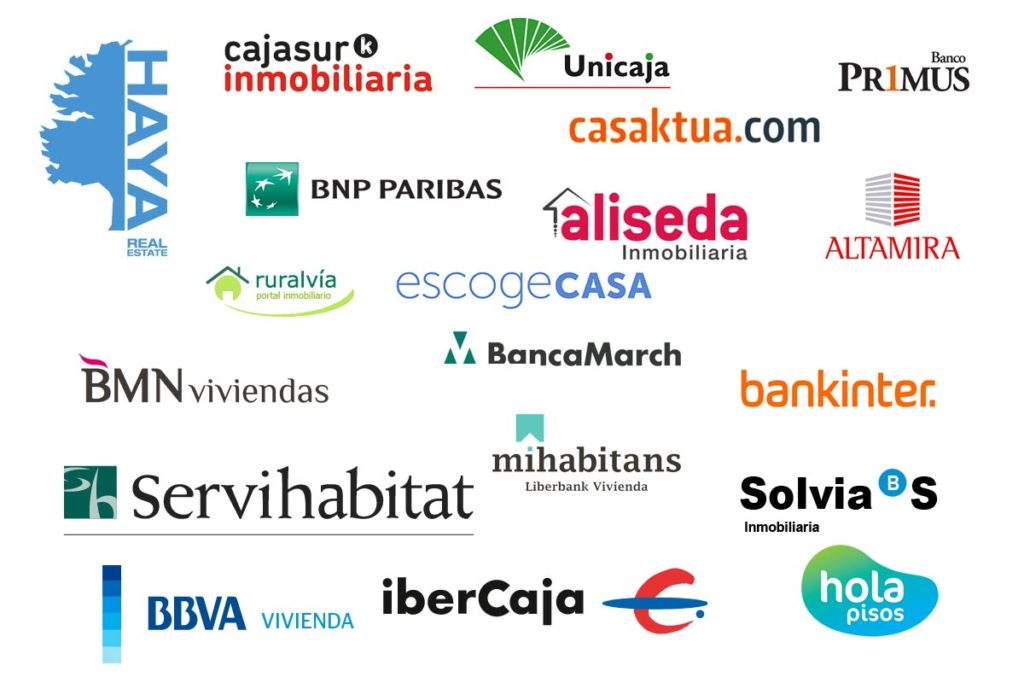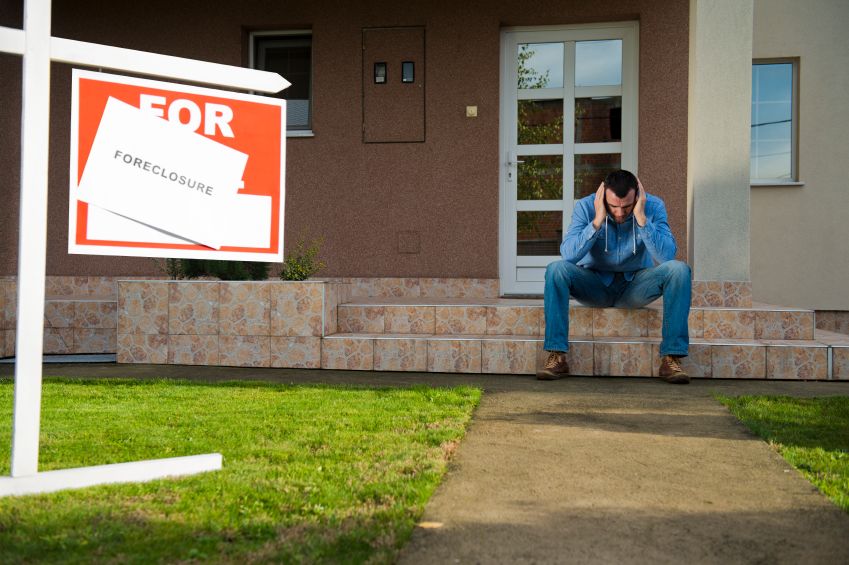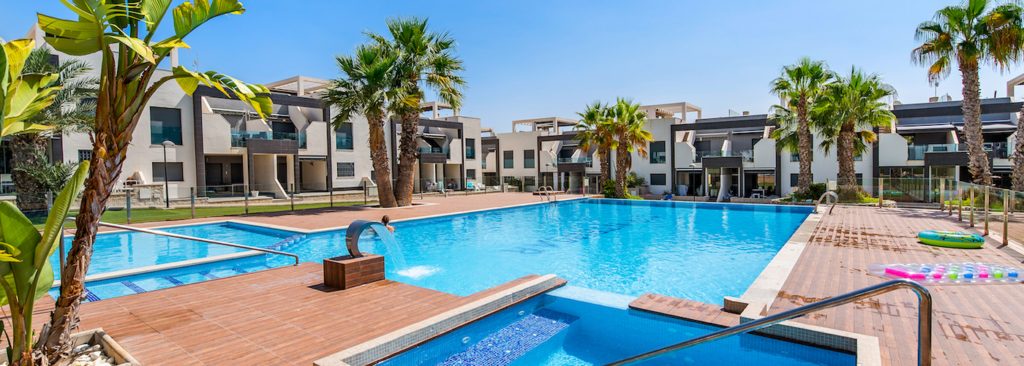Bank Repossession Spain
Is it still interesting to buy a home that has been repossessed by the bank in Spain?
Many people have bought a holiday home in Spain for the last decades and even today many still come to the sunny south to realize their dream.
However, their expectations are not always realistic.

During the real estate crisis of 2007 – 2008 in Spanje countless properties entered the market at ridiculous prices.
In the previous decade, many investors from all over Europe have been tempted to invest (too much) in Spanish real estate. Which was already priced very high at that time.

Most investors had taken out loans to do so because interest rates were quite low.
The purchase of multiple apartments or houses at once was, therefore, no exception.
At the outbreak of the crisis paying back these heavy loans became a problem. Therefore, many owners were forced to sell their investment at a loss or to let the bank execute the mortgages.

Consequently, banks were sitting on a huge pile of properties. They wanted to liquidate these properties massively to recover the loaned money.
Although the banks’ managers, responsible for the real estate portfolio, have certainly served their family, friends, and acquaintances first. A number of private buyers also have been able to benefit from the situation. This by buying a repossessed home.
Bank Repossession Costa Blanca
The best houses and apartments disappeared soon from the market and so exceptional opportunities haven’t presented itself anymore since then.
Besides the purchase of a repossessed property in Spain holds great risks.
Banks have financial expertise, but they certainly are not real estate specialists.

Their goal is to recover as much money as possible from the loans from their real estate portfolio. They want this with as little expenses as possible.
So as a buyer, you do not have to expect any service or support.
Bank repossession in Spain | what to watch out for
Even when you go to a real estate agent who is specialized in bank repossessions, extreme caution is of the essence.
In Spain all debts and charges that rest on a property follow this property, even when the ownership is transferred to a new owner. The latter then will be held fully liable.
In Spain, the notary has a different responsibility than in most European countries. He does not do any research and merely confirms the transfer of ownership between the seller and the buyer under the conditions that have been submitted to him.
Therefore, although not compulsory, it is strongly recommended to entrust a solicitor who specializes in real estate transactions with this research. If you do not do this, you take enormous risks.
What can go wrong?
A bank repossession is an emergency measure that is rarely carried out in good circumstances and with the cooperation of the owner.

On the contrary, owners often have been found to block or hinder proceedings.
In some cases, sockets and pipes were even ripped out of the walls and drains were filled with cement.

If you let yourself be tempted by such a bargain, you will end up spending a lot more then when you would have bought a regular home at a correct market price.
If you are careful and get good advice, you can still get a lot in Spain at very interesting prices.
Another stumbling block may be that necessary documents are missing, like the deed of the previous owner, the Cedula de Habitabilidad by which the authorities confirm that the property is suitable for habitation, etc.
Since loans could no longer be repaid for these properties, payments for utilities were also stopped in most cases. This does not only mean that the buyer will incur extra costs to have these utilities reconnected, but he will also have to pay all unpaid bills for gas, water, electricity, internet, alarm systems, etc.
In some cases, renovations or alterations to the property are not compliant with urban development regulations.
Liability for these infractions is passed on to the new owner too. He will be liable for damages to other parties, think of subsidence and cracks, for the forced removal and for heavy fines!
Such infractions are more difficult to detect with repossessed properties.
Bank repossessions | bankrupt project developers
Sometimes “old” newbuild projects are offered from bank repossessions.
Mostly these are apartments or houses from bankrupt project developers and thus they have never been inhabited.
Important potential problems here are flaws in the construction that have never been identified because the property has never been inspected for delivery.
Appliances, tubes, and equipment that have not been used for years, can be faulty and may stand for a considerable repair budget.
Last but not least you have to check if all necessary permits and licenses are available. Project developers sometimes start building before they have obtained their licenses. They do this because they think this will be no problem.

When the project developer went bankrupt, the application procedure was not followed up and the license and permits were not delivered…
An apartment or house from bank repossession in urbanization is subject to communal costs.
First of all, it is important to know if a community of owners has been founded.
If not, who will take care of the maintenance and repair of communal property? Like outer walls, roofs, halls and staircases, swimming pools, gardens, etc.?
If there is a community of owners, chances are that many properties are still abandoned and that the total communal costs have to be divided over a much smaller number of owners than originally planned. You certainly do not have to count on the bank to share the burden.
Conclusion about bank repossession in Spain:
Are properties from bank repossessions in Spain still interesting?
The general principle is: if it is too good to be true, then it is not true.
If ever bargains were on the market from bank repossessions in Spain, then this no longer is the case.

Furthermore, the risks are considerable and chances that you will find a good bargain are as big as for winning the lottery. With this difference that entering your lottery form will cost you a lot less.
In 2015 the Spanish consumer organization OCU already warned that properties from a bank repossession certainly are not always cheaper than properties offered by real estate agents or by private persons. (Article OCU 22/05/2015).
The Spanish real estate market is still very attractive. As well for the investor as for anyone who wants to come and enjoy the sun himself.

You still get a lot for your money and on top of it, you get an excellent climate all year long.
The difference with the episode around 2008, is that real estate is now priced correctly. That prices evolve upward in a reasonable and steady way. Above all, those properties are bought with available means. In 2008 people over-invested with heavy loans, which created a real estate bubble.
Also read our blog: Buying a property in Spain? Beware of fraud!








